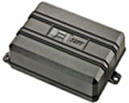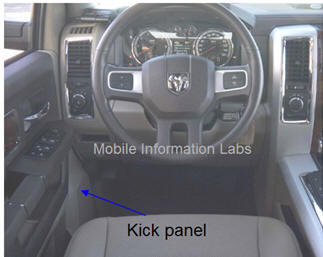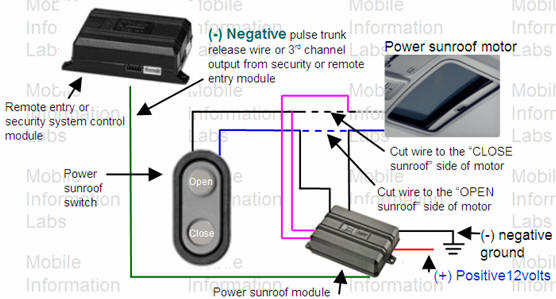|
 |
How-to-guides - Open and close your power sunroof by remote control
|
 
|
|
How to add a power sunroof
open or close module to your vehicle |
|
Remote
Sunroof open/close circuits
Remote entry or security system
auxiliary outputs are not just for opening the vehicles
trunk Opening or even closing the vehicles sunroof can add
that little extra convince on a rainy day.
|
|
|
Did you say open my sunroof?
As A matter of
fact the auxiliary outputs of any remote entry or security
system can be used to control just about any device in the
vehicle, such as sunroof, power windows, etc.
In this
chapter we will discuss wiring the remote entry or security
system to the power sunroof of your vehicle. |
|
Why would I want to do that?
The devise
is designed to open or close the power sunroof on most
vehicles. If you ask yourself, why would I want to do that?
Imagine having your sunroof open on a nice sunny day.
As the day
comes to an end a major rain storm comes out of the blue.
Now most people would have to run to the vehicle (in the
poring rain), get the key open the door , turn on the
ignition you get the point. But sine you thought ahead you
walk over to the closet window in you home and with a press
of a button your sunroof closes. Pretty
 cool.
Now imagine the opposite. cool.
Now imagine the opposite.
The day is
sweltering hot and now since you have the "power sunroof
toy" you press another button that open the sunroof from the
comfort of your air conditioned home. Get the now?
You can
also wire the power sunroof module to simply close when you
press the lock button on the remote of the remote entry or
security system. So imagine getting out of your vehicle and
with one press of a button you could:
-
Lock
all doors
-
Arm
alarm
-
Close
power sunroof
You can
even have the module do the same for all power window or
just the drivers!
See: Power window
roll-up circuits.
|
|
How does it work?
The power
sunroof module looks a lot like the brain of the remote
entry or security system. It is wired into the vehicles
power sunroof circuit. It is controlled by the auxiliary
output wire or 3rd channel output wire located on most
remote entry or security
system.
This wire
will send (usually) a negative pulse when a specific
button in depressed
on
the remote (see your owners manual for your remote entry or
security system for more detail on this function).
for more detail on this function).
When the
power sunroof module receives a negative voltage pulse from
the remote entry or security system, it activates a circuit
that monitors the current consumption of the power sunroofs
motor.
When the
sunroof is closing, the motor for example, may draw 5 amps
(this is just for argument sake and does not indicate what
the specific current draw of your power sunroof motor may
consume).
As It gets
to the end of its travel and stops, the current consumption
will dramatically increase in the sunroof motor. The power
sunroof module will sense this increase in current draw and
the turn off the power to the roof. It does the same when
opening the sunroof.
Now........., ready to get to work?
|
|
What do I have?
How to determine what
type of relay configuration your vehicle has.
You can verify
the type of system used by using a digital test light (for
safety to the cars electronics) or a voltage meter.
You should begin
by locating the wire that sends the specific voltage and
while opining the vehicles power sunroof and closing it you will
want to look for the change on your test light.
-
In most cases you
can find the harness to the power sunroof at the driver or passengers kick
panel, witch is basically the panel that your left foot (if
drivers)
"hangs" around when driving.
passengers kick
panel, witch is basically the panel that your left foot (if
drivers)
"hangs" around when driving.
-
Most vehicle kick panels will
snap off or will have a screw or two holding it in place.
Remove the kick panel to reveal the harness that goes from
the vehicle through the door jamb and into the door.
-
Usually
you will find the culprit at this harness.
|
|
|
What
next?
|
-
It is usually a negative.
Some security's systems will have the ability to change the
voltage signal from negative to positive.
-
If your system
only has a negative signal out you can easily convert that
negative signal to a positive by using a relay.
see relay configurations.
-
After making the correct
connections you should be able to press the aux button (depending on
manufacture) for two to three second and Walla!
Sunroof closes or opens all by itself
release!
|
|
Power
sunroof close circuit

About this circuit:
-
First
determine what channel you will be using on your remote
entry or security system, Note: see your owners
manual for specific wire outputs.
-
The remote
entry send a (typically) negative pulse to the power
sunroof module.
-
Connect the
two wires for "open" located on sunroof module between
the power sunroof switch and the motor You will cut this
wire and connect one end to the switch side and the other
to the power sunroof side.
-
Power sunroof
module will also require a constant fussed 12 volt
positive voltage and a negative ground.
How to determine what type of output my remote entry or
security system has:
-
You can verify
the type of output that the remote entry or security
system is currently using by using a digital test light (for
safety to the cars electronics) or a voltage meter.
-
You should begin
by locating the wire that sends the specific voltage pulse
form the remote entry or security system and
while pressing the specific button that your unit has
allocated for the auxiliary or 3rd channel output wire.
-
you will
want to look for the change on your test light, or volt
meter as it will indicate whether it is a positive or
negative voltage.
|
|
Change (-) Negative to (+) Positive
%20Negative%20to%20(+)%20Positive.jpg)
About this circuit:
-
If your
remote
entry or security system only has a Negative pulse out
for the auxiliary channel you can use this circuit to
convert it to a negative pulse
-
Connect the
terminals 86 and 87 to a fused (+) Positive 12volts
-
Connect the
Negative voltage out from the remote entry or security
system to the terminal 85 of the relay.
-
Terminal 30
will now send a Positive pulse for your application.
How to determine what type of output my remote entry or
security system has:
-
You can
verify the type of output that the remote entry or
security system is currently using by using a digital
test light (for safety to the cars electronics) or a
voltage meter.
-
You should
begin by locating the wire that sends the specific
voltage pulse form the remote entry or security system
and while pressing the specific button that your unit
has allocated for the auxiliary or 3rd channel output
wire.
-
you will want
to look for the change on your test light, or volt meter
as it will indicate whether it is a positive or negative
voltage.
|
|
Change (-) Positive to (+) Negative
%20Positive%20to%20(+)%20Negative.jpg)
About this circuit:
-
If your
remote
entry or security system only has a Positive pulse out
for the auxiliary channel you can use this circuit to
convert it to a negative pulse
-
Connect the
terminals 86 and 87 to a (-) Negative ground.
-
Connect the
Positive pulse voltage out from the remote entry or security
system to the terminal 85 of the relay.
-
Terminal 30
will now send a Negative pulse for your application.
How to determine what type of output my remote entry or
security system has:
-
You can
verify the type of output that the remote entry or
security system is currently using by using a digital
test light (for safety to the cars electronics) or a
voltage meter.
-
You should
begin by locating the wire that sends the specific
voltage pulse form the remote entry or security system
and while pressing the specific button that your unit
has allocated for the auxiliary or 3rd channel output
wire.
-
you will want
to look for the change on your test light, or volt meter
as it will indicate whether it is a positive or negative
voltage.
|
|